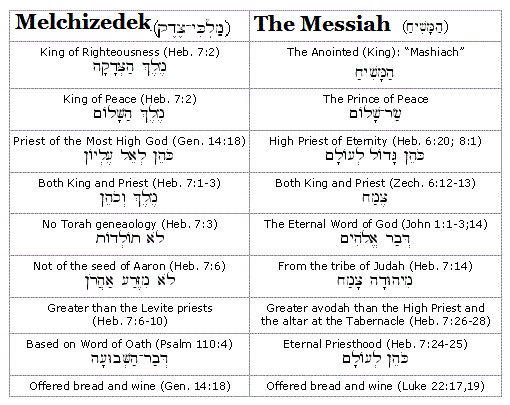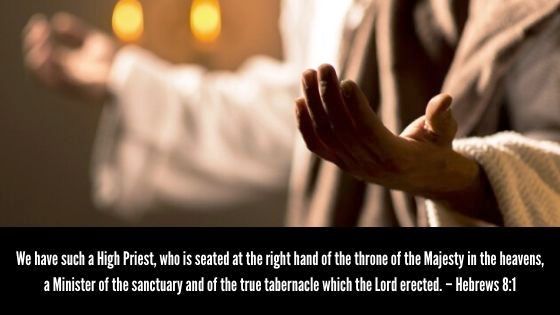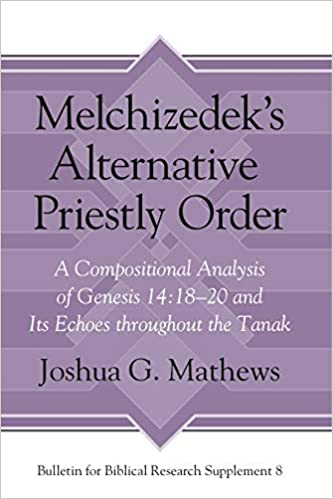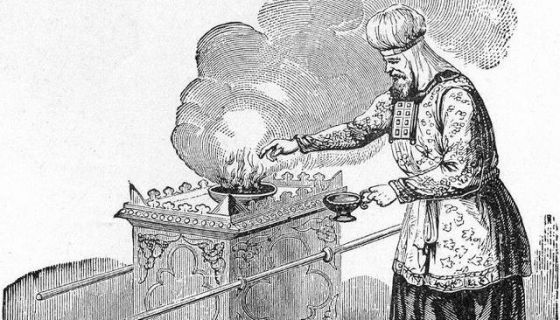One of the most mysterious and intriguing figures in the Bible is Melchizedek. Who is Melchizedek and why does the author to the Hebrews say that Jesus is a priest forever in the order of Melchizedek? Was Melchizedek Jesus Christ?
Who was Melchizedek?
Melchizedek, king of Salem and priest of the Most High God, is first mentioned in Genesis 14:17-20. After Abram returned from his victory over Chedorlaomer and his allies, Melchizedek, together with the king of Sodom, went out to meet him in the Valley of Shaveh.
Melchizedek brought Abram some bread and wine and blessed him saying, “Blessed be Abram of God Most High, possessor of heaven and earth; and blessed be God Most High, who has delivered your enemies into your hand” (Genesis 14:18-19).
Melchizedek’s family history is different. Although he was a man and had to have a mother and a father, the Old Testament has no record of his genealogy, and this is significant because most great persons in the Old Testament have their ancestry identified.
The name Melchizedek means “king of righteousness” in the Hebrew language. The word Salem means “peace” (the Hebrew word shalom) so that Melchizedek is “king of peace” as well as “king of justice.”
Note: Justice and peace are often found together in Scripture. True peace can be experienced only on the basis of righteousness and justice. If we want to enjoy peace with God we must be declared righteous (just) by faith (Romans 5:1). People cannot be right with God by keeping the Old Testament law (Galatians 2:21). Only through the work of Jesus Christ on the cross can justice and peace meet.
Melchizedek, a Type of Christ
How is Jesus like Melchizedek?
After his sudden disappearance in the book of Genesis, it is interesting how Melchizedek is presented in Psalm 110:4 as a “type of Christ.” David writes, “The Lord has sworn and will not relent, ‘You are a priest forever according to the order of Melchizedek.’”

The reason Jesus Christ can be a “priest forever” is that He belongs to the “order of Melchizedek.” Melchizedek’s priesthood differed from the Aaronic priesthood in a number of ways. First, he had no genealogy and thus his priesthood was understood to be eternal.
In Hebrews 7:1-3 we see five qualities of Melchizedek’s priesthood: It is a priesthood of righteousness, peace, a royal priesthood (Melchizedek was a king), a personal priesthood rather than an inherited priesthood, and it is eternal since it has no genealogy, beginning or end.
Jesus Christ: Priest Forever in the Order of Melchizedek
The order of Melchizedek indicates that Christ was not appointed to the Aaronic priesthood of the old covenant but to a priesthood that would replace it and would be greater, just as Melchizedek himself was greater than Aaron and even Abraham himself.
The priest was the only one who could present a gift to God (Hebrews 5:1). He could do so because he had to be chosen to be God’s servant. As the minister of God, the priest had special access to God’s presence and could approach more closely than ordinary worshipers. He was the intermediary between God and the people. He represents the people to God and God to the people.
In the Old Testament economy, the throne and the altar were separated. King Uzziah wanted to be both a priest and a king, and God judged him (2 Chronicles 26:16-20). But Melchizedek had both offices – king and priest. Aaron never had that privilege. And it must be noted that Melchizedek was not a counterfeit priest; he was the “priest of God Most High” and his ministry was legitimate.
Only in Jesus Christ and in pre-law Melchizedek were these two offices combined. Jesus Christ is the High Priest on the throne.
Psalm 110:4, the central verse of David’s messianic psalm, is important to the message of the book of Hebrews (Hebrews 5:6, 10; 6:20; 7:17, 21) because it announces that the Messiah will be both King and Priest, something unheard of in the Old Testament history.
More importantly, in this psalm, Melchizedek pictures our Lord as a heavenly High Priest. If Jesus were on earth, He could not minister as a priest because He did not belong to the tribe of Levi. Jesus was born of the seed of David, the tribe of Judah. But because His priesthood is after the order of Melchizedek, who was both king and priest, He can minister in heaven today.
Jesus Christ is Our Great High Priest
In Hebrews 8:1-3 we read that “we have such a High Priest, who is seated at the right hand of the throne of the Majesty in the heavens, a Minister of the sanctuary and of the true tabernacle which the Lord erected, and not man; a high priest who is appointed to offer both gifts and sacrifices.”
This high priest is Jesus Christ. As a High Priest, Jesus must offer gifts and sacrifices (Hebrews 5:1). We must not, however, get the impression that our Lord is offering sacrifices in heaven that corresponds to the Old Testament sacrifices. Rather, Jesus offered Himself once and for all as the sacrifice for our sins (Hebrews 7:27).
In Hebrews 10:11-18, the writer contrasts the old covenant high priest with Jesus Christ, our great High Priest. The fact that Jesus sat down after He ascended to the Father proves that His work was completed (Hebrews 1:13; 8:1).

The ministry of the priests in the Tabernacle and Temple was never done and never different; they would offer the same sacrifices day after day. This constant repetition was proof that their sacrifices did not take away sins. What tens of thousands of animal sacrifices could not accomplish, Jesus accomplished with one sacrifice forever!
Christ’s position as the great high priest enabled Him to play a special role in our redemption. Because He was appointed priest, Christ was able to offer His death as a sacrifice for others. He became the sacrifice on earth that He might become the High Priest in heaven.
Was Melchizedek Jesus Christ?
Melchizedek was not an angel or some superhuman creature; nor was he an Old Testament appearance of Jesus Christ. He was a real man, a real king, and a real priest in a real city. But as far as the record is concerned, he was not born, nor did he die (Hebrews 7:8). In this way, he pictures the Lord Jesus Christ, the eternal Son of God, who is Priest “forever.”
It may not have been obvious to Abram at that time, but the mysterious priesthood of Melchizedek pointed forward to the eternal priesthood of Jesus Christ who would minister grace and mercy to us based on His own sacrifice for our sins.
Jesus is our great and eternal High Priest who lives forever. He is the high priest who is Himself sinless and never needs to offer any sacrifices for His own sin. In the offering of Himself, He made the perfect sacrifice which once and for all opened the way to God.
And no other sacrifice needs to be made, hallelujah, praise God!
Have you received Jesus’ sacrifice for your sins?
Recommended Resource:
Melchizedek’s Alternative Priestly Order: A Compositional Analysis of Genesis 14:18-20 by Joshua Mathews
Product Description:
 Genesis 14:18-20 is a brief episode depicting the encounter between Abram and Melchizedek.
Genesis 14:18-20 is a brief episode depicting the encounter between Abram and Melchizedek.
Taking this episode and its context in the Pentateuch as the starting point, Mathews sets out to analyze the text as it has been composed, in order to understand the biblical and theological significance of this priest-king Melchizedek.
The thesis proposed and investigated is that Melchizedek’s royal priestly portrayal in Genesis initiates a priesthood that is intentionally presented as an alternative to Aaron and his priesthood.
The claim is that this distinct priestly order is evident in the biblical text as we have it, and it may be discerned by reading the text carefully, on its own terms, with close attention to its compositional features.
Chapter 1 introduces the study and offers an overview of the history of interpretation related to Genesis 14 and Melchizedek.
In chapter 2, various hermeneutical issues and approaches are examined in order to clarify the methodology and identify some of the problems being addressed.
In chapter 3, the heart of the book, Mathews considers Genesis 14:18-20 in the context of the Pentateuch, focusing on Melchizedek in relation to the Abrahamic narrative and covenant, the royal message of the Pentateuch, and Aaron’s priesthood.
Beginning with Psalm 110, chapter 4 identifies echoes of Melchizedek and his priesthood in several texts in the Prophets and Writings. The book concludes in chapter 5 with a summary and synthesis of the preceding analysis as well as some implications and suggestions for further research.


Melchizedek and Jesus are the same. The image of the invisible God. First theophany, second became flesh and dwelt among us. Same Priest, different covenant.
Melchizedek is king and priest, and He accepted the sacrifices according to the law. Then He stepped down from His Throne. He became flesh and dwelt among us, and sacrificed himself once and for all for all our sins.
Melchizedek is the image of God in theophany, and Jesus is the image of God in the flesh. God is eternal, immortal, and invisible. That’s the reason for having an image.
Hi John,
Thank you for your thoughtful comment and for engaging so deeply with the topic of Melchizedek and Christ.
You have highlighted important truths about Melchizedek’s king‐priest office and the way Christ fulfills that role. I appreciate your conviction.
I actually hold a slightly different view: I see Melchizedek as a biblical type or foreshadowing of Christ’s eternal priesthood rather than a direct pre-incarnate appearance of Christ.
I’d love to explore with you how both views draw on Hebrews 5-7 and Psalm 110, and how we might think about the significance of the “order of Melchizedek.”
Thanks again for sharing. I look forward to continuing the conversation with you and mutual humility as we seek to honor Christ together.
In Christ,
Alice
Hi Patricia,
Do you mean a Melchizedek Bible? Sorry, we don’t. And I am not sure if there is such.
But should you want to read more about Melchizedek, you can check out my recommended resource. Just follow the link and you will be directed to the store.
God bless!
Do you have a bible Melchizedek high priest? I would like to purchase one.